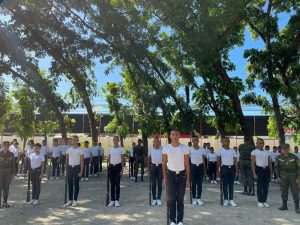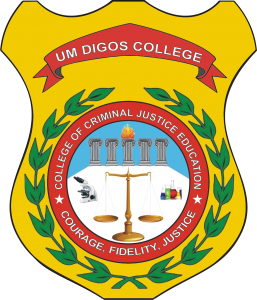- DEPARTMENT OF CRIMINAL JUSTICE EDUCATION





UMDC Criminology Interns Reception Rites 2022
“To prevent yourself from dying, you must overcome the limits of your physical strength. Overcoming the limits of physical strength requires a strong will.”
– Naruto Uzumaki
A bachelor’s degree in criminology can lead to various career opportunities that include but are not limited to field investigator, forensic psychologist, correctional counselor, paralegal, intelligence analyst, probation/ parole officer, and a variety of other positions within law enforcement, academia, psychology, sociology, and others may pursue employment in courts or legal offices.
Bachelor of Science in Criminology
The field of criminology is the study of crime and the various agencies of justice as they operate and react to crime, criminals and victims. It is therefore the mission of the Criminology program to provide the community with professionally competent and morally upright graduates who can deliver efficient and effective services in crime prevention, crime detection and investigation, law enforcement, public safety, custody and rehabilitation of offenders, criminological research, among others.
Objectives
- To produce socially and morally upright Criminologists who are responsible, resilient and responsive to the enforcement law and public order.
- To provide students with ethical perspectives and judgments in applying knowledge to field related problems.
- To engage the faculty in development programs that harness their knowledge and skills for efficient and quality instruction
- To provide students with updated facilities and resources that support meaningful learning.
- To conduct researches that generate new knowledge and innovations in the field of public safety and social defense.
- To strengthen partnership and linkage with varied agencies where students can acquire soft and hard skills needed in the profession.
- To contribute to the understanding and awareness of the diverse Filipino culture through application of values integrated in the curriculum.
Program Educational Objectives
- Demonstrate professional & technical competence in the practice of the profession.
- Exhibit honesty, integrity and professionalism in the performance of duties and responsibilities.
- Professional development programs through graduate work, technical advancement, and self-directed learning.
- Student Outcome
- Articulate and discuss the latest developments in the specific field of practice;
- Effectively communicate orally and in writing using both English and Filipino;
- Work effectively and independently in multi-disciplinary and multicultural teams;
- Act in recognition of professional, social and ethical responsibility;
- Preserve and promote “Filipino historical and cultural heritage”;
- Conduct criminological research on crimes, crime causation, victims, and offenders to include deviant behavior;
- Utilize criminalistics or forensic science in the investigation and detection of crime;
- Apply the principles and jurisprudence of criminal law, evidence and criminal procedure;
- Demonstrate competence and broad understanding in law enforcement administration, public safety and criminal justice;
- Ensure offenders’ welfare and development for their re-integration to the community.
- Internalize the concepts of human rights and victim welfare
Career Opportunities
- Dactylographer
- Ballistician
- Questioned Document Examiner
- Forensic Photographer
- Polygraph Examiner
- Probation Officer
- Parole Officer
- Special Investigator
- Special Agent
- Investigative Agent
- Intelligence Agent
- Law Enforcement Evaluation Officer
- National Police Commission (NAPOLCOM) Inspector
- Traffic Operation Officer
- Associate Graft Investigation Officer
- Special Police Officer
- Safekeeping Officer
- Sheriff
- Security Officer
- Criminal Investigator
- Warden
- Reformation Officer
- Fire-fighter
- Fire Marshall
- Jail Officer up to the rank of Jail Superintendent
- Police Officer up to the rank of Police Superintendent and other law enforcement agencies, and agencies under the Criminal Justice System
- Academe (Dean, Program Head, Faculty)
- Recent Activities





